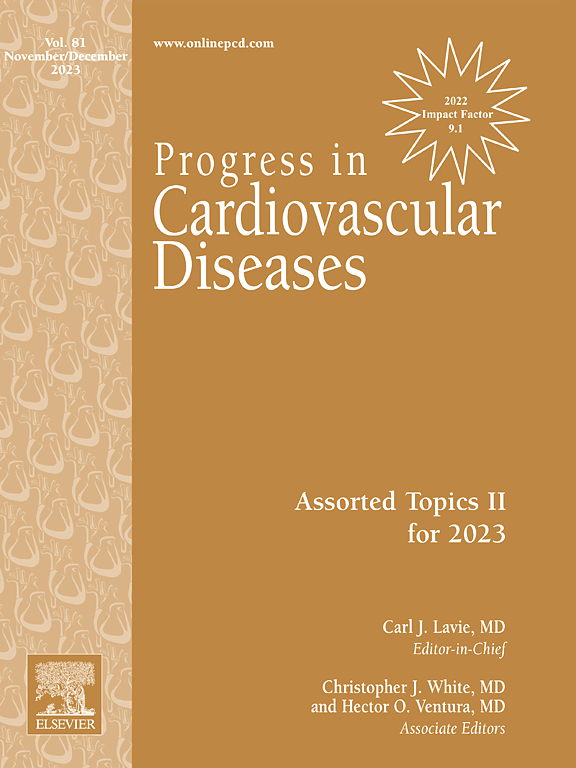Healthy and unhealthy plant-based diets and the risk of cardiovascular diseases: The Rotterdam study and updated meta-analysis
IF 5.6
2区 医学
Q1 CARDIAC & CARDIOVASCULAR SYSTEMS
引用次数: 0
Abstract
Background
Consumption of more plant-based foods is gaining popularity, but the role of healthy versus unhealthy plant-based diets in cardiovascular disease (CVD) risk remains inconclusive.
Objectives
We investigated associations of plant-based diet indices (PDIs) with incident CVDs in a prospective cohort study and conducted an updated meta-analysis.
Methods
We included 3507 men and 5345 women of the population-based Rotterdam Study. Multivariable Cox proportional hazard models were used to estimate hazard ratios (HRs) and 95 % confidence intervals (CIs) for CVD, coronary heart disease (CHD) and stroke per SD increment of an overall PDI, healthy PDI (hPDI) and unhealthy PDI (uPDI), among men and women separately. We combined our findings with previously published effect estimates in an updated meta-analysis.
Results
We documented 2015 CVD cases (1231 CHD and 952 stroke) during 107,290 person-years follow-up. Among men, the PDI and hPDI were associated with a 7 % (HR 0.93, 95 % CI 0.87–0.99) and 8 % (HR 0.92, 95 % CI 0.86–0.98) lower CVD risk. Among women, there was evidence suggesting a U-shaped association of the PDI with stroke (pnon-linearity < 0.01). In meta-analyses including up to 43,067 incident CVD cases among 359,740 participants from nine studies, the PDI and hPDI, were associated with a lower CVD riskand the uPDI with a higher CVD risk (pooled HRs [95 % CI], per SD, PDI: 0.94 [0.91–0.97], I2 = 50.4 %; hPDI: 0.94 [0.91–0.98], I2 = 74.7 %; uPDI: 1.03 [1.01–1.06], I2 = 49.0 %).
Conclusions
Our findings support recommendations to consume relatively more healthy plant-based foods for CVD prevention. Potential differences by sex and non-linear associations warrant further investigation.
健康和不健康的植物性饮食与心血管疾病风险:鹿特丹研究和最新荟萃分析。
背景:食用更多的植物性食品越来越受到人们的欢迎,但健康与不健康的植物性膳食在心血管疾病(CVD)风险中的作用仍无定论:我们在一项前瞻性队列研究中调查了植物性饮食指数(PDI)与心血管疾病发病率的关系,并进行了最新的荟萃分析:我们纳入了基于人群的鹿特丹研究中的 3507 名男性和 5345 名女性。我们使用多变量 Cox 比例危险模型分别估算了男性和女性在总体 PDI、健康 PDI(hPDI)和不健康 PDI(uPDI)每 SD 增量下心血管疾病、冠心病(CHD)和中风的危险比(HRs)和 95 % 置信区间(CIs)。我们在最新的荟萃分析中将我们的研究结果与之前发表的效果估计值相结合:在 107,290 人年的随访中,我们记录了 2015 例心血管疾病病例(1231 例冠心病和 952 例中风)。在男性中,PDI和hPDI分别与心血管疾病风险降低7%(HR 0.93,95% CI 0.87-0.99)和8%(HR 0.92,95% CI 0.86-0.98)相关。在女性中,有证据表明 PDI 与中风呈 U 型关系(非线性 2 = 50.4%;hPDI:0.94 [0.91-0.98],I2 = 74.7%;uPDI:1.03 [1.01-1.06],I2 = 49.0%):我们的研究结果支持为预防心血管疾病而摄入相对较多的健康植物性食品的建议。潜在的性别差异和非线性关联值得进一步研究。
本文章由计算机程序翻译,如有差异,请以英文原文为准。
求助全文
约1分钟内获得全文
求助全文
来源期刊

Progress in cardiovascular diseases
医学-心血管系统
CiteScore
10.90
自引率
6.60%
发文量
98
审稿时长
7 days
期刊介绍:
Progress in Cardiovascular Diseases provides comprehensive coverage of a single topic related to heart and circulatory disorders in each issue. Some issues include special articles, definitive reviews that capture the state of the art in the management of particular clinical problems in cardiology.
 求助内容:
求助内容: 应助结果提醒方式:
应助结果提醒方式:


